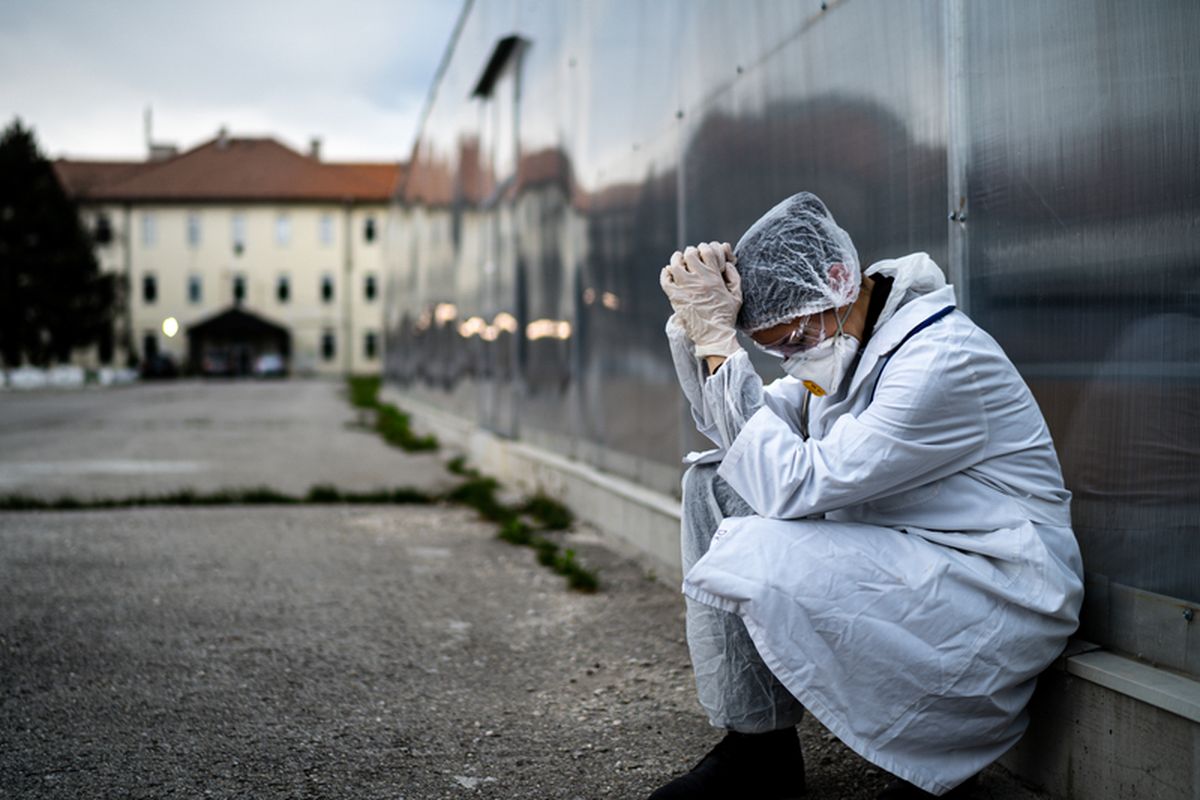
WASHINGTON, KOMPAS.com - While the past year’s battle with COVID-19 has been grueling for health care workers across America, the challenge has been compounded for Asian medical professionals, who have also had to work amid a wave of pandemic-inspired anti-Asian attacks.
“The past year, it was just so many different mixed emotions between the pandemic... [and] issues? regarding? racial ?injustice. All that put together made last year very different from other years,” said Austin Chiang, a doctor whose parents emigrated from Taiwan to the U.S. 10 years before he was born in Irvine, California.
On the same day that six Asian American women were slain with two other individuals in Atlanta last week, the advocacy group Stop AAPI Hate released a report that cited 3,795 hate incidents targeting Asian Americans and Pacific Islanders between March 19, 2020, and Feb. 28, 2021.
More than 500 of the incidents were recorded since the beginning of this year.
COVID-19 was first detected in humans in Wuhan, China, in late 2019. Spreading globally since then, it has felled more than 548,000 people in the U.S., where there have been more than 30 million confirmed cases, according to the Johns Hopkins Coronavirus Resource Center.
Not gonna lie — given recent events, I walked a little faster to get home and avoided eye contact with anyone. #StopAsianHateCrimes
— Austin Chiang, MD MPH (@AustinChiangMD) March 17, 2021
In 16 of the most populous U.S. cities, attacks on Asian Americans increased in 2020 by almost 150% over the previous year, according to data compiled by California State University’s Center for the Study of Hate and Extremism.
That has made the past year a time of reflection for Chiang, who holds a master’s degree in public health from Harvard University and an M.D. from Columbia University.
He has been active on social media countering COVID-19 misinformation?as the chief medical social media officer for 14 hospitals operated by Thomas Jefferson University in Philadelphia, Pennsylvania, and founder of the Association for Healthcare Social Media (AHSM).
The death of George Floyd, an African American man who died while in police custody in May in Minnesota, and the resurgence of the Black Lives Matter movement, “made me rethink a lot of things about ways we can try to incorporate equity around my workplace and making sure that others feel like they are treated fairly and are seen and heard,” the gastroenterologist told VOA Mandarin.
“It’s definitely been jarring and a bit hard to reconcile because at the same time feeling … we’re being judged not for our skill but for our appearance, and certainly that’s something that affects so many different people.”
“The funniest thing was a Caucasian gentleman called me, like, ‘Eggrolls,’” said Vannthath Man, 42, of Haymarket, Virginia, an ICU nurse at Inova Fairfax Hospital who studied nursing at George Mason University in Fairfax, Virginia.
Also read: 2 Indonesian Citizens Fall Victim to Racial Abuse in the US
“I don't take these things personally … He may have that thought in the back of his mind but if he was not medicated, if he was not confused, he would not have said it. But it doesn't make him right to think that way.”
Born in Battambang, Cambodia, Man was bullied to tears and outcast during his first years of school after he arrived in the U.S. in 1989 at the age of 12 with his family.
At the time, Man told VOA Khmer he thought “it might be a good idea if someone were to help …maybe I wouldn't have the suicidal thoughts, maybe I didn't have to go through such a hard time. So that's why I went into the help industry or (became) a nurse because I want to help people.”
On a day when four of his six COVID-19 patients died in the ICU, Man turned to the self-care methods created for himself as a teen.
“Culturally, our family (was) not very open on talking about certain things. … A lot of time (I dealt) with things by myself. … So with that day, I thought … about what positive attributes you have, what positive things you give to the community.”
Asians, U.S.- and Asian-born combined, are disproportionately represented in health care given their numbers in the overall population, according to figures from the Migration Policy Institute and the U.S. Census.
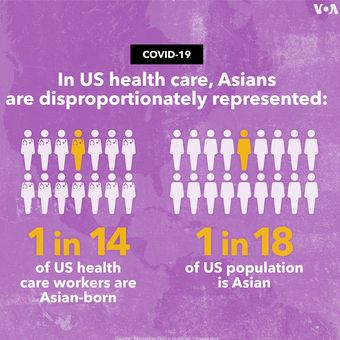 Proportion of Asians in US heath care
Proportion of Asians in US heath careOf the foreign-born health care workers in the U.S., 40% come from Asia.
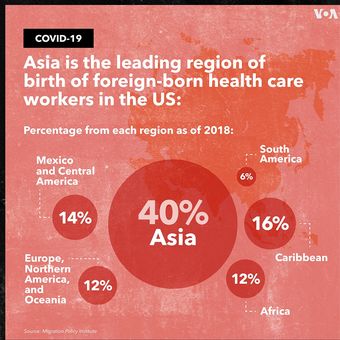 40% of health care workers in the US come from Asia
40% of health care workers in the US come from AsiaAdam Conners, 35, is a native of Malang, East Java in Indonesia. He arrived in the U.S. in 2011 for a visit with friends.
He collapsed with seizures brought on by late-stage tuberculosis and spent three months in George Washington University Hospital in Washington, D.C., where the nurses delivered his treatment with such care he decided to join their ranks.
After learning English, he enrolled in an accelerated nursing program at Chamberlain University in Downers Grove, Illinois, condensing four years of study into 30 months. He graduated in 2017 with a bachelor’s degree.
“It was tough,” Conners told VOA Indonesia of his intense program. Now an ICU nurse in the hospital where he returned to health, he treats African Americans,?Hispanics,?Asians, Middle Easterners, Caucasians, “everyone the same. They are my patients.”
His first COVID-19 patients were in their?70s and 80s, but now they are younger people, in their 20s and 30s.
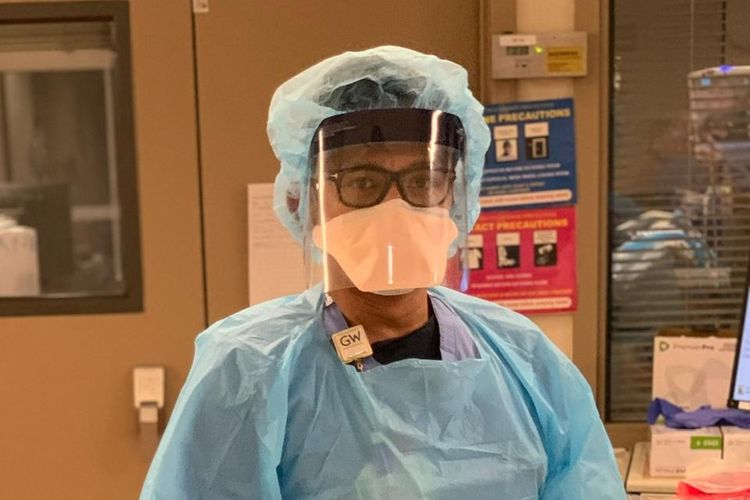 Adam Conners is a nurse from Indonesia
Adam Conners is a nurse from Indonesia“It's really sad. It's really depressing,” Conners said. “And when I go out from work, when I (leave) work, I see people in the street outside … not wearing masks or they're just not doing social distancing. … it (breaks) my heart.”
If only those on the street could “see inside of this hospital, people … dying,” said Conners, who would like to return to Indonesia to work with a local clinic, build?an outpatient clinic?and “try to help my people.”
Nursing during the pandemic has taught Conners the value of self-care, which includes taking care “of my mind, my mental? well-being,” said Conners, who estimates he has witnessed 100 patients die from COVID-19.
Sometimes “I feel like COVID just beat me. … Or I feel like I just lost in a battle with COVID.”
Also read: Asians in Germany Targets of Racist Stereotypes, Violence
Wengang Zhang, 67, was born in China’s Sichuan province, and arrived in the U.S. in 1988 with a medical degree he’d earned from what is now the Chongqing University of Medical Sciences.
A primary care doctor, he completed his U.S. training in 1999 with a residency at the University of California-Los Angeles Medical Center.
Zhang told VOA Mandarin the biggest challenge he faced to be able to practice medicine in the U.S. was “definitely the language but another big difference is the system, insurance kind of stuff. I had never heard about … medical insurance, or Medicare, Medicaid.”
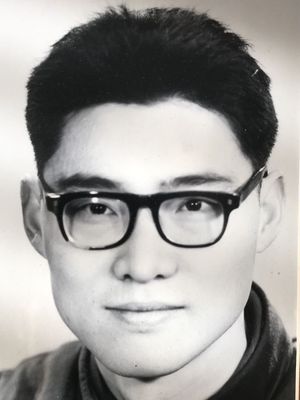 Dr. Wengang Zhang arrived in the US in 1988. He's a primary care doctor in California.
Dr. Wengang Zhang arrived in the US in 1988. He's a primary care doctor in California.He practices at the Springhill Medical Group in Contra Costa County, east of San Francisco, where he treats patients who are “white, they are Black, Spanish or Pacific Islander.”
He told VOA Mandarin he admitted the county’s first COVID-19 patient after being called to a local emergency room.
“I can tell you exactly the day …March 1st. … Everything, the data, matched whatever we were learning from China’s experience.”
The county’s first COVID-19 patient turned out to be one of Zhang’s own, “a healthy young guy, and he had no idea where he got it.”
After the examination, Zhang left the hospital, opened all his car’s windows, drove home, parked, stripped and rushed to take a shower without stopping to talk to his wife.
“It's actually in my over 20-something years of practice, the first time when (I realized) my own life may be in danger because I saw this patient,” said Zhang.
According to an investigation by Kaiser Health News and The Guardian, of the 3,561 health care workers who have died on the U.S. front line as of January, 21% were Asian/Pacific Islanders.
One who survived COVID-19 is Tsering Dechen, 28, a Tibetan who arrived in the U.S. in 2010 after finishing high school in Nepal, following her mother’s urging to get a good education.
After a series of odd jobs, she earned a bachelor’s degree in nursing from Lehman College, in New York City, in 2019. She’s a progressive care nurse at Elmhurst Health & Hospital in New York City, a job she started weeks before the first COVID-19 cases arrived.
Her workplace is in the heart of Queens, a borough known for a rich diversity of residents from Africa, Asia, Europe, Oceania, and South and Central America.
“I feel like Elmhurst Hospital is the best example that one can have on how we all coexist together,” said Dechen, who says she’s been hearing of violence directed at Asian Americans, in particular an attack on an Asian American doctor.
Candid thoughts re: #StopAsianHate
No amount of inner fortitude will protect me against stupid, reckless behavior...
— Austin Chiang, MD MPH (@AustinChiangMD) March 20, 2021
“Why would you attack a person, a single person, just because he's Asian American?” she asked. “How can you blame a pandemic on just one single person?? How can you show your angst and attack somebody like that?"
“Every day I realize how similar we are,” Dechen told VOA Tibetan. “Our elderlies, their needs … you see how much of a similarity there (is) ...in these different ethnicities."
Tien Tan Vo, 44, graduated from Ross University School of Medicine in the West Indies and is now medical director of VO Medical Center in California’s Imperial Valley, an agricultural area bordering Mexico.
He began treating COVID-19 patients last March, when he faced the most difficult days of the pandemic because “we didn’t have enough tests at that time.”
Patients wanted to be tested, and “they, of course, …(were) very anxious, (it’s) very, very frightening, they want to know the result right away. … (It’s) very, very stressful, very stressful …about the testing and the anxiety level of this pandemic.”
Vo, who was born in Vietnam’s Binh Dinh province, sent the tests to San Diego for processing and told patients they had to wait for the results.
He recalled walking out to the parking lot of his clinic to test one patient who was later diagnosed with COVID-19.
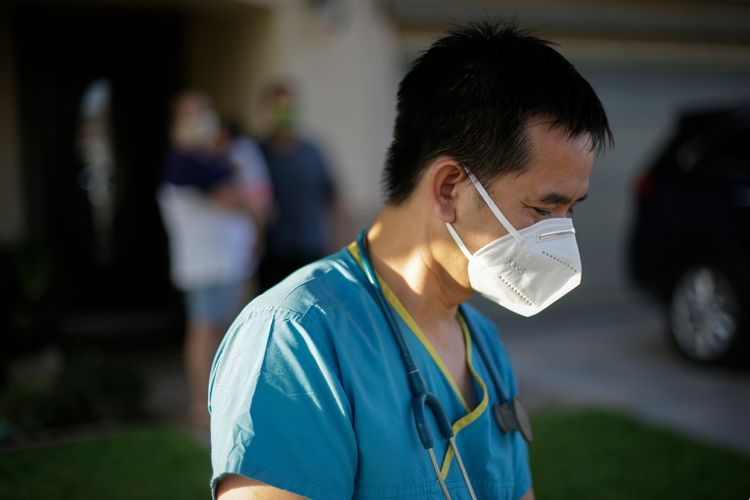 FILE - Dr. Tien Tan Vo leaves after talking with a family quarantining after they tested positive for the coronavirus July 23, 2020, in Calexico, California.
FILE - Dr. Tien Tan Vo leaves after talking with a family quarantining after they tested positive for the coronavirus July 23, 2020, in Calexico, California.“I came out with a full PPE (protective personal protective gear), I covered from head to toe because we don't know what's going on with the virus … and I asked her to lower the window and she started crying and she couldn't talk because she was (out of breath) as she's gasping for air.”
Transferred to the local hospital and then to a San Diego medical center, the patient was ventilated, the family was frantic, “then on Day 11, she turned around, suddenly got better on her own,” Vo told VOA Vietnamese.
He admitted another patient with symptoms to the hospital, where he was up and walking around after a few hours. The next day, the man couldn’t walk and after administering I.V. steroids,? an I.V. infusion, and plasma transfusions “we couldn’t help him at all.”
Four days after the initial diagnosis, the patient became Vo’s first to die of COVID-19.
Vo didn't know what to say to the family,?but they were “nice enough to call me and inform me, ‘Doctor Vo, you tried your best. Don't worry. Don't be sad.’ … They even encouraged me to continue to help other people.”
Also read: Overseas Indonesians Contracting Covid-19 Rise to 4,000
“I've been a nurse for more than 30 years, I've been through the death and the birth, but this is an unbelievable for me… I did not follow the numbers because it's so discouraging,” said Anchalee Dulayathitikul, 55, an intermediate care nurse.
She arrived in the U.S. in 2014, after deciding she wanted an American education for her children.
She had opted for a nursing career because her grandfather thought she had a caring nature. Dulayathitikul earned her degree in nursing and midwifery in 1988 from Chiang Mai University in Thailand.
More than a quarter century later, she passed all the tests in the battery needed for nursing certification in Maryland on her first sitting.
Also read: Indonesian Embassy in Japan to Account for Indonesian Nationals After Earthquake
She works at the University of Maryland Upper Chesapeake Medical Center and after a year, she told VOA Thai, “I see the flow and I see? how we? can ?take care of (COVID-19 patients) successfully.”
Dulayathitikul plans visit her unwell mother in Thailand once the pandemic, and its travel restrictions retreat. She will return to Maryland for her children and her career “because I love my career a lot.”
Darunee Rasameloungon, 41, a Bangkok native who arrived in the U.S. in 1991 with her family to join her father who had emigrated ahead of them. She wanted to be an engineer or an FBI agent until she helped care for a cousin after a bus hit him, breaking his arms and legs.
 Darunee (Jackie) Rasamelougon is a nurse technician at Reston Hospital Center in Virginia. (Courtesy Darunee (Jackie) Rasamelougon)
Darunee (Jackie) Rasamelougon is a nurse technician at Reston Hospital Center in Virginia. (Courtesy Darunee (Jackie) Rasamelougon)When she decided to pursue nursing, her father told her he couldn’t pay for college on what he earned delivering pizza.
Working with her high school counselor, Rasameloungon parlayed high grades, volunteer work and school activities into scholarships to pay for all four years at George Mason University’s nursing school in Fairfax, Virginia.
She graduated in 2001 and is now a progressive care unit nurse technician at Fairfax Hospital, where she has worked since 2008.
“It's always hard, this is very sad when you have to wrap someone in the bag, you know, … they died by themselves,” she told VOA Thai.
“They have nobody with them, and their family cannot be with them, (it) is really sad …to die by yourself. It is really overwhelming. My God, you feel sorry for them. And it's just, like a reality hit: This . . . can happen to anybody.”
Although Rasameloungon intends to continue nursing in the U.S. in part to remain close to her son, she wants to take a long break in Thailand when the pandemic subsides because “the COVID (made) me realize that I want to spend more time with my family.”
Born in Menifee, California, Limyi Heng, 38, is the child of Cambodian refugees. He spent three years in the Air Force, most of the time in Southern California. “But I did a lot of tours all around the United States, which gave me a deep appreciation for the diversity of America.”
His Air Force mentor guided him into a career as a nurse practitioner, and he earned his master’s degree in nursing from Columbia University, where he developed a network that informed him early about the spread of COVID-19 in New York City and elsewhere.
Also read: Coronavirus: Why EU Lags Behind China and Russia in ASEAN Vaccine Diplomacy
He works at Redlands Community Hospital and San Gorgonio Memorial Hospital.
The surge of COVID-19 cases began in October and continued through December. “There wasn't really a worst moment. I think it was this really, the long hours, the long hours,” Heng told VOA Cambodian.
For him, the upside at work is “being part of a team” that includes hospital housekeepers, the logistics people who deliver protective gear and community leaders who provide “the right messaging, the right information” to “drown out the misinformation.”
For Conners, similar teamwork 2,600 is what leads to his proudest moments of the pandemic, when patients “leave the ICU. This kind of a big accomplishment (is) from the teamwork that we have done.”
Simak breaking news dan berita pilihan kami langsung di ponselmu. Pilih saluran andalanmu akses berita Kompas.com WhatsApp Channel : https://www.whatsapp.com/channel/0029VaFPbedBPzjZrk13HO3D. Pastikan kamu sudah install aplikasi WhatsApp ya.



































